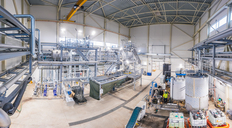- First phase construction completed in 2020; second phase started, with industrial supply expected by Q4 2022.
- SWEETWOODS converts over 90% of hardwood into high-quality lignin and wood sugars.
- Tecnaro confirms high-purity lignin can substitute conventional lignin in biocomposites.
- Global Bioenergies scales up bio-isobutene production from wood sugars at ton scale.

Project Overview
The SWEETWOODS project, funded by the Bio-Based Industries Joint Undertaking (BBI JU), has begun shipping industrially representative samples of high purity lignin and wood sugars from its facility in Imavere, Estonia. The first phase of construction was completed in 2020, and the second phase, which includes hydrolysis, separation processes, and lignin drying, is underway. An industrial supply is expected by the last quarter of 2022.
Technological Advancements
The SWEETWOODS demo plant uses sustainable hardwood biomass to demonstrate novel pre-treatment technology combined with innovative enzymatic solutions. This process converts over 90% of hardwood into high-quality feedstocks for biomaterials and biochemicals, establishing new bio-based value chains with a low ecological footprint.
Evaluation and Testing
Preliminary performance tests have shown promising results, yielding high purity lignin and sugars. Tecnaro has confirmed that the high-purity lignin can substitute conventional lignin in biocomposite production, offering improved product quality without odor. Recticel is evaluating which lignin types are suitable for rigid foam insulation boards, with further upscaling planned.
Commercialization Efforts
Global Bioenergies has successfully scaled up the production of bio-isobutene from wood-derived sugars and is progressing towards commercializing renewable cosmetics, with the first EU registration of a key cosmetic-grade ingredient derived from fermentative isobutene.
Environmental Impact
Consortium member 2B is conducting a Life Cycle Assessment (LCA) to evaluate the environmental and socio-economic performance of the SWEETWOODS plant and its products. The LCA identifies environmental hotspots in the fractionation process, aiding in eco-design and providing a numeric estimate of the environmental benefits compared to other biorefining processes.

